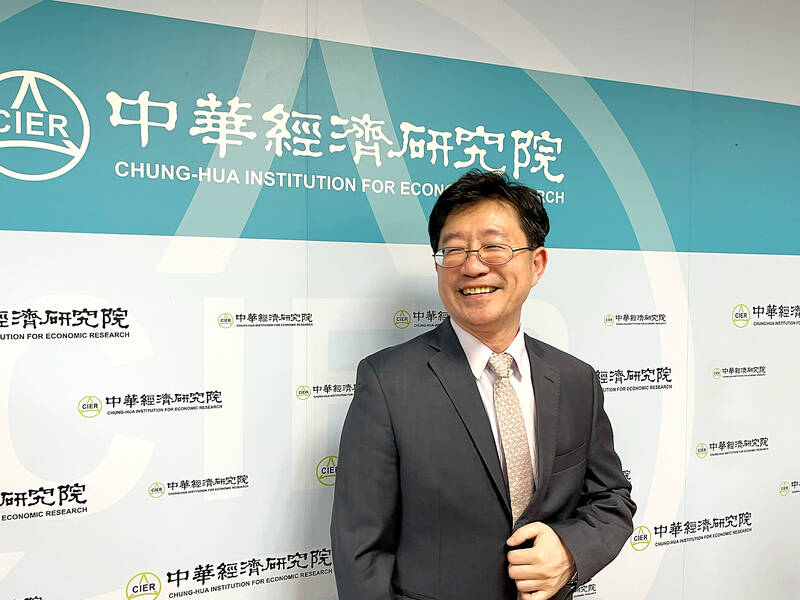Taiwan’s manufacturing purchasing managers’ index (PMI) last month decreased 5.3 percentage points to 48.9, as most manufacturers have adopted a wait-and-see attitude, the Chung-Hua Institution for Economic Research (CIER, 中華經濟研究院) said yesterday.
Among the major sub-indices, the six-month outlook plunged 23.1 percentage points to 36, marking the deepest decline since the outbreak of the COVID-19 pandemic in February 2020, indicating that local manufacturers are conservative about their business prospects, the CIER said.
The decrease is attributable to an easing in front-loading orders by manufacturers, as businesses turned conservative after US President Donald Trump proposed a 32 percent tariff on Taiwanese goods, CIER president Lien Hsien-ming (連賢明) told a news conference in Taipei.

Photo: Hsu Tzu-ling, Taipei Times
Most manufacturers are still in talks with overseas clients about their countermeasures and how to share the tariff costs, Lien said.
Although some believe the front-loading trend is slowing down, it is still ongoing, he said.
The reading on new orders dropped 9.3 percentage points to 47.5, as global trade was overshadowed by Trump’s unpredictable tariff and trade policies, China’s chip origin rule changes and a new US port surcharge on Chinese goods, the Taipei-based institute said.
The value of the new orders last month fell below the threshold of 50, the CIER said.
The subindex on industrial output plunged 8.3 percentage points to 47.5, ending two months of expansion, the CIER said.
By sector, half of the six major sectors tracked by the think tank showed contraction with readings below 50.
The electronics and optical industry, key to Taiwan’s economy, stayed above 50, but fell 4.7 percentage points to 54.1, as growth in new orders eased since most clients adopted a wait-and-see attitude instead of placing urgent orders as they did in March, CIER said.
Customers remained indecisive about how to share the tariff burden, it said.
Although several subindices showed declines last month, most manufacturers remained cautious rather than anxious about future developments, said CIER researcher Chen Shin-hui (陳馨蕙), who is in charge of the PMI survey.
This month’s index decline is mainly due to front-loading having been completed in March and a strong March performance setting a high comparison base, Chen said.
The institute is paying attention to the employment subindex, which dropped 4.4 percentage points to 46.6 percentage points, she said.
Academia Sinica fellow Kamhon Kan (簡錦漢) said order momentum could continue through mid-June, as the process is still ongoing.

Taiwanese suppliers to Taiwan Semiconductor Manufacturing Co. (TSMC, 台積電) are expected to follow the contract chipmaker’s step to invest in the US, but their relocation may be seven to eight years away, Minister of Economic Affairs J.W. Kuo (郭智輝) said yesterday. When asked by opposition Chinese Nationalist Party (KMT) Legislator Niu Hsu-ting (牛煦庭) in the legislature about growing concerns that TSMC’s huge investments in the US will prompt its suppliers to follow suit, Kuo said based on the chipmaker’s current limited production volume, it is unlikely to lead its supply chain to go there for now. “Unless TSMC completes its planned six

Intel Corp has named Tasha Chuang (莊蓓瑜) to lead Intel Taiwan in a bid to reinforce relations between the company and its Taiwanese partners. The appointment of Chuang as general manager for Intel Taiwan takes effect on Thursday, the firm said in a statement yesterday. Chuang is to lead her team in Taiwan to pursue product development and sales growth in an effort to reinforce the company’s ties with its partners and clients, Intel said. Chuang was previously in charge of managing Intel’s ties with leading Taiwanese PC brand Asustek Computer Inc (華碩), which included helping Asustek strengthen its global businesses, the company

Power supply and electronic components maker Delta Electronics Inc (台達電) yesterday said second-quarter revenue is expected to surpass the first quarter, which rose 30 percent year-on-year to NT$118.92 billion (US$3.71 billion). Revenue this quarter is likely to grow, as US clients have front-loaded orders ahead of US President Donald Trump’s planned tariffs on Taiwanese goods, Delta chairman Ping Cheng (鄭平) said at an earnings conference in Taipei, referring to the 90-day pause in tariff implementation Trump announced on April 9. While situations in the third and fourth quarters remain unclear, “We will not halt our long-term deployments and do not plan to

TikTok abounds with viral videos accusing prestigious brands of secretly manufacturing luxury goods in China so they can be sold at cut prices. However, while these “revelations” are spurious, behind them lurks a well-oiled machine for selling counterfeit goods that is making the most of the confusion surrounding trade tariffs. Chinese content creators who portray themselves as workers or subcontractors in the luxury goods business claim that Beijing has lifted confidentiality clauses on local subcontractors as a way to respond to the huge hike in customs duties imposed on China by US President Donald Trump. They say this Chinese decision, of which Agence